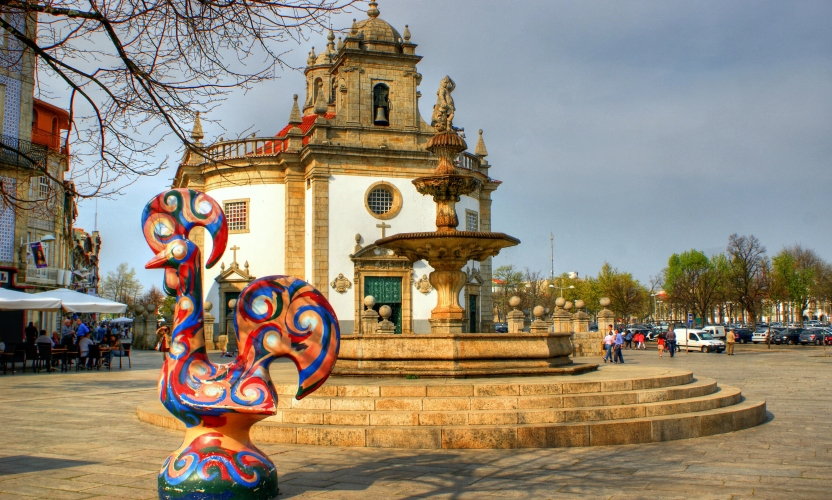
The Legend of the Barcelos Cockerel: A Camino de Santiago Tale
One of Portugal’s most enduring folk legends, the Barcelos Cockerel (Galo de Barcelos), has a fascinating link to the Camino de Santiago. Today, the brightly painted ceramic rooster is one of the most recognizable symbols of Portuguese culture—but few know that its origin is rooted in a story of justice, faith, and pilgrimage.
A Pilgrim’s Arrest in Barcelos
The legend begins in the northern Portuguese town of Barcelos, a popular stop on the Portuguese Camino to Santiago de Compostela. A pilgrim from Galicia—known as a Gallego—was traveling through the town on his way to the shrine of Saint James when he was wrongly accused of theft or other serious crime.
Despite his pleas of innocence, he was arrested and condemned to hang. Desperate to save his life, the man asked to be brought before the judge one last time.
“That Cockerel Will Crow!”
The judge was in the middle of a meal when the pilgrim was ushered in. In a bold and desperate act of faith, the man pointed to the roast chicken on the judge’s plate and declared:
“If I am innocent, that cockerel will crow in the morning.”
The judge dismissed the claim but was unnerved by the man’s conviction. The next morning, just as the execution was about to take place, something miraculous happened: the cooked bird stood up on the table and crowed.
A Miraculous Escape and a Legacy of Faith
Shocked and convinced of the pilgrim’s innocence, the judge rushed to the gallows, arriving just in time to see that the noose had tightened imperfectly, sparing the man’s life. The execution was halted, and Gallego was released and pardoned.
Years later, the pilgrim is said to have returned to Barcelos and, in gratitude, built a monument to São Tiago (Saint James) and the Virgin Mary, commemorating his miraculous deliverance and his sacred journey.
The Symbol of the Portuguese Rooster Today
Today, the Barcelos Cockerel is a vibrant icon of Portuguese identity, often associated with good luck, faith, and honesty. It also stands as a subtle reminder of the enduring influence of the Camino de Santiago on Portuguese culture.
You’ll find versions of the rooster in shops, markets, and souvenirs across the country, especially along the Camino routes. For pilgrims, it symbolizes hope, justice, and the miracles that can happen on the road to Santiago.
Are you interested in experiencing Portugal while on a Camino walk? Explore our Camino Tours in Portugal.








